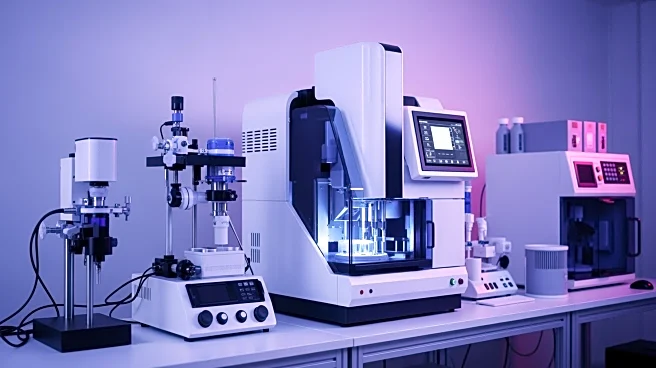What's Happening?
Nomic Bio has published its foundational nELISA technology in Nature Methods, showcasing a high-throughput, high-plex immunoassay platform that addresses reagent-driven cross-reactivity to maintain specificity
at scale. The publication coincides with the release of a 1.4 million-data-point PBMC cytokine perturbation dataset in the Nomic Portal, which allows for comprehensive exploration and analysis of proteomic data. The nELISA technology integrates with Nomic's bead-based multiplexing technology, enabling multiplexed, absolute quantification of proteins with high specificity and sensitivity. This advancement allows for proteome-wide throughput in drug discovery applications, as demonstrated by a large-scale PBMC perturbation study completed in a week using a single operating line.
Why It's Important?
The development of Nomic Bio's nELISA technology represents a significant advancement in the field of proteomics, offering a scalable and systematic approach to protein quantification. This technology complements transcriptomic data by providing a direct, functional readout of immune regulation, which is crucial for understanding cell states and interactions. By enabling large-scale, quantitative profiling of secreted proteins, nELISA has the potential to accelerate drug discovery and biomarker development, making proteomics more accessible and routine in modern biology. The ability to measure protein changes in response to various perturbations could lead to new insights into immune regulation and disease mechanisms, benefiting researchers and pharmaceutical companies.
What's Next?
Nomic Bio plans to scale its nELISA platform to a 1,000-plex offering, known as Omni 1000, designed for broad discovery at disruptive cost and unmatched throughput. The Perturb-PBMC dataset is now available for interactive exploration in the Nomic Portal, allowing users to visualize data, filter conditions, and generate publication-ready figures. This development is expected to enhance the integration of proteomics across all stages of drug and biomarker development, potentially leading to new therapeutic discoveries and improved patient outcomes. Researchers and industry stakeholders may leverage this technology to advance their understanding of complex biological systems and accelerate the translation of scientific discoveries into clinical applications.
Beyond the Headlines
The introduction of nELISA technology by Nomic Bio could have long-term implications for the field of proteomics, shifting it from a specialized experiment to a routine part of biological research. This advancement may lead to ethical considerations regarding data privacy and the use of large-scale biological datasets. Additionally, the technology's ability to provide a functional readout of immune regulation could influence public health policies and strategies for disease prevention and management. As proteomics becomes more integrated into research and development processes, it may drive cultural shifts in how scientific data is shared and utilized across disciplines.











